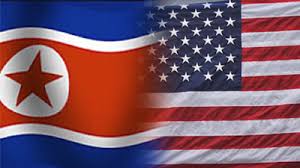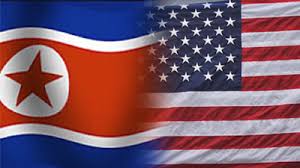Tensions on the Korean Peninsula have reignited yet again after the North’s rocket launch earlier this month. An obvious solution to avoid recurring war risk is to convene mutual talks.
Tensions on the Korean Peninsula have reignited yet again after the North’s rocket launch earlier this month. An obvious solution to avoid recurring war risk is to convene mutual talks. But that’s the last thing that Washington appears to want.
It w as indomitable British wartime leader Winston Churchill (1874-1965) who famously coined the phrase: “To jaw-jaw is always better than to war-war”. Meaning dialogue with one’s enemy is always the preferred option. That’s saying something coming from Churchill whose popular image is one of a feisty pugilist.
as indomitable British wartime leader Winston Churchill (1874-1965) who famously coined the phrase: “To jaw-jaw is always better than to war-war”. Meaning dialogue with one’s enemy is always the preferred option. That’s saying something coming from Churchill whose popular image is one of a feisty pugilist.
The admonition is apposite in the context of the latest bout of tensions on the Korean Peninsula. China’s Foreign Ministry spokesman Hong Lei this week urged the United States and North Korea to engage in earnest talks over long-running security disputes.
Washington has given no indication of heeding China’s advice. Indeed, the latest move has seen US F-22 stealth warplanes make flyovers in South Korea this week in a show of military strength to the North.
“We urge the US and North Korea to sit down and negotiate to explore ways of resolving each other’s reasonable concerns, and to finally achieve the goal we all want,”said Hong Lei during diplomatic talks with counterparts in South Korean capital Seoul.
China is certainly not happy with its traditional North Korean ally’s recent rash behavior. After the latest rocket launch, China made a rare rebuke of Pyongyang, especially since its appeals to refrain from the launch had been ignored. Nevertheless, Beijing sees the US policy of constantly sanctioning and isolating North Korea as futile.
Surely, “the goal we all want” must be normal, peaceful relations in the region, not just between the two Koreas, but more generally.
In this regard, Washington’s hidebound policy of isolating and sanctioning North Korea is untenable. The persistent Cold War posture is a dead-end. More ominously, such policy casts a dangerous shadow over regional relations. Its logical conclusion is relentless conflict, and ultimately all-out war.
Pyongyang’s latest satellite launch using ballistic rocket power – coming only weeks after an underground nuclear blast test – has once again reignited tensions and recriminations.
South Korea has responded by withdrawing economic links via the Kaesong industrial complex, and this week President Park Geung-hye warned the North that it faces “regime collapse” if it pursues its nuclear weapons program.
There are even calls among South Korean and Japanese politicians for their states to acquire nuclear weapons as protective measures.
North Korea’s leader Kim Jung-Un has responded angrily that Seoul’s cutting off economic ties is “an act of war”.
There is a depressing predictability to this spiral of belligerence. For more than 50 years, since the Korean War ended in 1953, the divided states have been convulsed by repetitive confrontations, which inevitably mar wider regional relations.
Washington’s response to North Korea’s latest rocket launch on February 7 is also predictable. It has accused Pyongyang of threatening its allies in the region and of secretly building intercontinental ballistic missiles (ICBMs) aimed at striking the United States’ mainland.
Presidential contenders in the US are vying with each other in condemning North Korea as a “national security threat”. If any of the Republican party contenders are elected as president later this year, based on their fiery rhetoric, we can expect further deterioration in northeast Asian relations.
In claiming to defend its allies, the US is already moving ahead with the installation of the anti-ballistic “missile shield” in South Korea and Japan. The Terminal High Altitude Area Defense (THAAD) system has long been opposed by China as a destabilizing shift in the balance of nuclear power. Ostensibly, deployed to defend against future North Korea ICBMs, the THAAD system also undermines China’s own nuclear forces because it can be viewed as affording the US a “first-strike” nuclear potential.
There is more than a sneaking suspicion that Washington is using the alleged threat posed by North Korea as a pretext for its bigger strategic ambitions of undermining China.
In any case, what needs to be recognized is that five decades of hostility must be averted. There must be a profound policy change. And China is right. The only forward for a viable, sustainable future is through genuine dialogue.
It is no good just condemning North Korea over its behavior. Yes, Pyongyang can be accused of violating United Nations sanctions and provoking tensions.
But the question needs also to be asked: why has the United States steadfastly refused to engage in dialogue with North Korea?
The last multi-lateral talks involving the US, the two Koreas, China, Japan and Russia broke down in 2008 and have not been resumed, largely due to Washington’s insistence on demonizing Pyongyang as a “rogue state”. That’s amazing when you think about it. No substantive talks in nearly a decade while the danger of a nuclear confrontation looms.
Those talks broke down because North Korea accused Washington of not delivering on promised sanctions relief and on technological assistance to convert its nuclear program for civilian applications. Sensing that Washington was not prepared to normalize relations, the North resumed its nuclear weapons program. In 2009, it conducted its second atomic blast test, in 2013 the third and in January this year, the fourth.
Clearly, at this rate, the impasse with North Korea will only lead to a grave confrontation some time in the future.
Given the brutal history of war and destruction rained down on North Korea by the US during the Korean War –in which millions died from massive carpet bombing of cities –it is understandable that Pyongyang has deep grievances and apprehensions about American intentions. Especially since the US and its South Korean ally never signed an armistice to definitely conclude the 1950-53 war with a peace treaty.
From North Korea’s viewpoint, it remains on a war footing because Washington in particular has not given a commitment to abide by peaceful relations. What is Pyongyang to do given the decades of US-imposed crippling economic sanctions, recurring “war games” and Washington’s offensive Cold War-style rhetoric lampooning it as a rogue state?
Jaw-jaw is better than war-war, but Washington’s refusal to engage in mutual dialogue leaves little option other than perennial conflict.
Which tends to answer the bigger question of why the US avoids talk and normalizing relations.
Peace in the region would remove America’s self-justification for maintaining its inordinate military presence. That suggests that the real problem here is not North Korea. It is the US and its destabilizing hegemonic ambitions.
Disclaimer:
Al-Manar is not responsible for the content of the article. All opinions expressed are those of the writer not Al-Manar’s or its staff.
